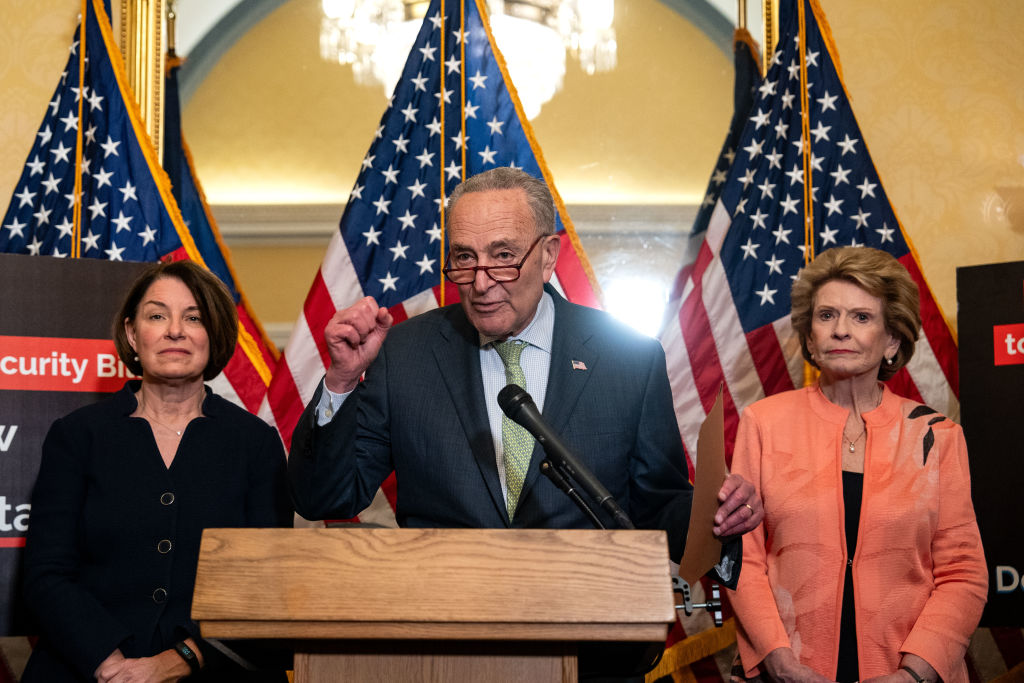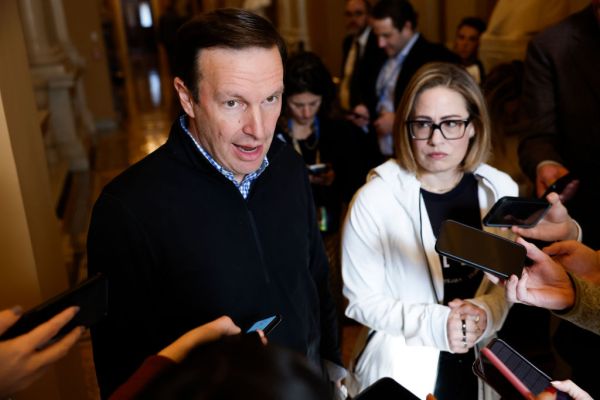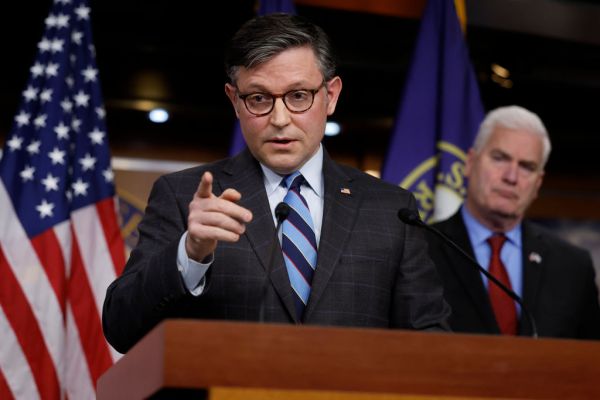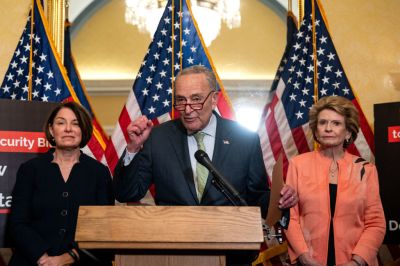Happy Thursday! British Prime Minister Rishi Sunak called a snap general election yesterday and scheduled it for the Fourth of July—not a terribly auspicious day for the unity and success of the British government. 🦅🇺🇲🦅
Quick Hits: Today’s Top Stories
- The U.S. Defense Department said Tuesday that Russia likely launched a space weapon last week—a claim Russian officials subsequently denied. “Russia launched a satellite into low Earth orbit that we assess is likely a counter space weapon presumably capable of attacking other satellites in low Earth orbit,” Maj. Gen. Pat Ryder, a Pentagon spokesperson, said Tuesday. “Russia deployed this new counter space weapon into the same orbit as a U.S. government satellite.”
- British Defense Minister Grant Shapps on Wednesday accused China of providing lethal aid—rather than the previously known dual-use technology and economic buttressing—supporting Russia’s war against Ukraine. “Today, I can reveal that we have evidence that Russia and China are collaborating on combat equipment for use in Ukraine,” Shapps said in a speech. “Lethal aid is now, or will be, flowing from China to Russia and into Ukraine.” Shapps did not publicly provide the evidence supporting the accusation.
- The leaders of Ireland, Norway, and Spain announced Wednesday that their countries would recognize Palestinian statehood. “Today, Ireland, Norway, and Spain are announcing that we recognize the state of Palestine,” Irish Taoiseach Simon Harris said yesterday. “Each of us will now undertake whatever national steps are necessary to give effect to that decision.” In response, Israel recalled its ambassadors from the three countries.
- The Biden administration announced Wednesday it was “canceling” another $7.7 billion in student loans for an additional 160,000 borrowers—public service workers or those who were enrolled in the Biden administration’s revised income-based repayment plan. “I will never stop working to cancel student debt—no matter how many times Republican elected officials try to stop us,” President Joe Biden said in a statement. His administration has now transferred about $167 billion in loans from 4.75 million individual borrowers to American taxpayers.
- A wave of storms and tornadoes struck southwestern Iowa on Tuesday, wreaking havoc on the city of Greenfield, killing four people and injuring at least 35 others. Dozens of buildings and homes were completely leveled. Search and rescue crews were still combing through the wreckage on Wednesday for any trapped survivors or additional victims.
- The families of 17 children killed and two injured in the school shooting in Uvalde, Texas, two years ago said Wednesday that they had agreed to a $2 million settlement with the city. The families also announced, however, that they are separately suing 92 Texas Department of Public Safety Officers and the school district for their alleged failures in confronting the gunman at Robb Elementary School who killed 21 people on May 24, 2022. A Department of Justice investigation into the shooting released in January found that the delay in law enforcement response likely resulted in more people dying than if the police had followed “generally accepted practices” in an active shooter situation.
Immigration Bill Redux

At the State of the Union in March, just weeks after Sen. James Lankford watched his fellow Republicans reject a bipartisan immigration bill he’d spent months painstakingly negotiating, he did something conservative Republican senators from Oklahoma almost never do: He publicly agreed with a Democratic president.
As President Joe Biden rattled off provisions in the ill-fated bill as Republicans booed, Lankford, a vacant look in his eye, nodded and mouthed, “That’s true.” He likely thought that was the end of his misery over what turned about to be futile months of negotiations. But like most political predictions, that was wrong.
Three months after the bill failed to pass in the upper chamber, Senate Majority Leader Chuck Schumer is trying again, planning to hold another vote on the legislation this week, more as a political exercise than a policy one. With immigration front of mind for voters—and Biden and moderate Democratic candidates running tight races across the country—Schumer and the Biden administration are tag-teaming on immigration efforts, perhaps to try to generate some upbeat mood music around what has historically been a losing issue for Democrats.
“This week, the Senate will return to the pressing need of our nation’s border security,” Schumer said in a letter to Senate colleagues on Sunday. “I hope Republicans and Democrats can work together to pass the bipartisan Immigration bill this coming week.”
“The American people do not have the luxury of playing partisan blame games,” he continued “They want bipartisan action to secure the border.”
Congressional Republicans were quick to pour cold water on the plan. Republican Sen. Roger Marshall of Kansas on Wednesday compared Schumer’s push for the legislation to a firefighter using gasoline instead of water to put out the fire—“and then expects praise for it.” Republican Sen. Marsha Blackburn of Tennessee called it a “political stunt.”
“We know that [Democrats’] polls are showing they are wrong on this issue,” Blackburn said. “They are trying to recover.”
Republicans in the House were also quick with their criticism. “Should it reach the House, the bill would be dead on arrival,” Speaker Mike Johnson and GOP House leadership said in a statement. If that line prompted some déjà vu, recall that Johnson tweeted those exact words in February in response to the first effort to pass Lankford’s bill.
As we wrote in February, the bill proposes some significant changes to immigration policy—that were nevertheless unlikely to totally please everyone. It would recreate a version of the pandemic-era Title 42 authorities and allow Customs and Border Protection (CBP) officials to immediately expel migrants under certain circumstances, as well as fund the hiring of more CBP agents. The bill also includes changes in asylum law that would see migrant application claims heard by U.S. Citizenship and Immigration Services asylum officers, rather than the immigration court system, with the intention of expediting the process that can see delays up to a decade.
“It’s hard to quantify all the changes because you don’t know exactly how the administration will implement them for sure,” David Bier, director of immigration studies at the Cato Institute, told TMD. “But, on the whole, it’s certainly not the answer to our immigration problems.”
It’s no secret why Schumer is eager to put “Democrats” and “border security” back in the same sentence. In a February Gallup poll, 55 percent of Americans said “large numbers of immigrants entering the country illegally” was a “critical threat” to the “vital interests of the United States.” In the first month of Biden’s presidency, in 2021, only 46 percent of Americans believed that threat was “critical.”
Voter concerns about immigration are showing in presidential polls, too. In an April New York Times/Siena College survey of registered voters nationwide—that found the two candidates in a statistical tie—50 percent said they approved of how Trump handled immigration as president, while only 34 percent of voters were in favor of Biden’s handling of immigration policy.
Voters’ growing concern for immigration aligns with U.S. migration trends. In the 2024 fiscal year alone—now halfway gone—the CBP has reported more than 1.5 million encounters at the Southwest border, likely on track to meet or exceed the nearly 2.5 million encounters in FY 2023. That figure was a roughly 4 percent increase over FY 2022.
Democratic leaders are likely hoping that a vote on the bill will convince voters they are working toward solutions—and that Republican opposition is responsible for broader congressional gridlock and inaction on immigration. “It’s a hacky gambit, but pretty typical of the kind of failure-is-success pseudo-legislative activity we expect,” Chris Stirewalt wrote this week. “Especially in an election year.”
The Schumer plan seems to be part of a one-two punch with the White House—which has signaled its support for the immigration bill redux—to tout progress on securing the border. The Biden administration has in recent weeks announced plans that tinker with existing border enforcement policy: Last week, the White House placed visa restrictions on 250 people and three organizations connected with the Nicaraguan government to counter the influx of migration from the country, which has become a hub for people transiting from a third country to the U.S. Earlier this month, the Biden administration also altered asylum system rules to expedite the deportation of migrants whose asylum claims were declined over national security concerns. Although the tweak would not change any qualifications for asylum claims, it would permit rejected migrants to be deported earlier in the review process.
This renewed effort to pass the immigration reform bill—which independent Sen. Kyrsten Sinema of Arizona and Democratic Sen. Chris Murphy of Connecticut drafted with Lankford—seems doomed to fail. And it may do so perhaps even more dramatically than it did the first time it came up for a vote, when the border security compromise was linked to something Democrats and some hawkish Republicans desperately wanted: aid for Ukraine. In February, the Senate rejected the bill in a 49-50 vote, well short of the requisite 60-vote threshold. At the time, only five Democratic Senators voted against the bill.
More Democrats could oppose the immigration deal this time around, without the Ukraine aid as a spoonful of sugar for the medicine of a compromise that contained few progressive priorities like a path to legalization or citizenship for illegal immigrants currently in the U.S. Schumer acknowledged that much himself on Sunday. “I will be honest,” he wrote in his initial letter to his colleagues. “I do not expect all Democrats to support this legislation. Many of our colleagues do not support some of the provisions in this legislation, nor do I expect all Republicans to agree to every provision.”
Republicans are also unlikely to suddenly support a bill they panned so vociferously three months ago, when all but four Republicans voted against the legislation. In February, a reporter asked Lankford how it felt to be thrown under the bus by his Republican colleagues. “And backed up [over],” he clarified.
The bus is on the move again, but this time with Lankford aboard it, saying the move is more style than substance at this point. “No one’s actually trying to sit down and solve it right now,” Lankford said last week. “And that’s my frustration.”
The other three Republicans are similarly disillusioned. “It’s an entirely political exercise,” Republican Sen. Mitt Romney of Utah, who voted for the bill in February, told The Dispatch on Wednesday. “They’re trying for something, to say that they’re the solution, not the problem. It’s not going to work.”
Democrats possibly consider the gambit worth taking if only to draw the contrast to the presumptive Republican nominee, who opposed the Senate immigration package—calling it a “horrible open borders betrayal of America”—so fiercely that he wanted credit for the bill’s failure. “Please blame it on me,” Trump said at a campaign rally in January. “Please.”
“Biden’s not campaigning on successes,” Ana Rosa Quintana-Lovett, a former staff director for the Western Hemisphere under House Foreign Affairs Committee Chair Michael McCaul, told TMD. “Biden’s campaigning on the perception that Republicans are unfunctional, and that Republicans are the party that is beholden to an extremist ideology.”
Romney does not believe Schumer’s politicking is likely to move the needle for voters. “The American people have already made their mind up about who is responsible for the mess of the border,” he told The Dispatch on Wednesday. “And no amount of political maneuvering is going to change that perception and that reality.”
Worth Your Time
- Writing for Persuasion, Eboo Patel outlined a roadmap for restoring respect for pluralism in our public life—starting at colleges and universities. “Pluralism is a particular approach to diversity work,” he wrote. “Pluralism views identities mostly as a source of inspiration, not as conferring a status of victimization. Pluralism cherishes particularity and resists separating people into flat binaries. … Pluralism seeks to cultivate the wide space between wokeness and whitewashing. It recognizes that Robin DiAngelo on the left and Ron DeSantis on the right are not the only two options on the intellectual landscape. … We need a sector of our society to model pluralism, and prepare leaders who can help others apply its key principles. I think higher education is that sector. Where else but a residential college campus do you get a wide range of identities converging in a small physical space? The intellectual resources to learn about various traditions? To explore theories of pluralism? To acquire the skills of bridge-building? Where else do you get the civic space to apply what you are learning at virtually the same time that you are learning it?”
- Jerusalem Demsas explored the benefits and pitfalls of public opinion polling in a piece for The Atlantic. “Polls are incredibly useful in trying to demystify public opinion,” Demsas wrote. “They’re much better than heuristics such as ‘I ran into a guy at the grocery store’ and ‘I saw a lot of lawn signs on my morning commute.’ But issue polls are still merely tools that help uncover public opinion. They’re not public opinion itself.” And polls can often be structured in misleading ways. “We should also be wary of polls that ask respondents to render instant judgment on oddly specific questions,” she wrote. “What does it even mean to say that 54.6 percent of Americans think that the funding structure for the Consumer Financial Protection Bureau is unconstitutional? Or that 81 percent of Arizonans support conserving 30 percent of America’s land and waters by the year 2030? More respondents might consider the 30 percent goal excessive if you told them that it would require setting aside more than 600,000 square miles of additional land—an area more than twice the size of Texas.”
Presented Without Comment
CNN: Nikki Haley Says She’s Voting for Trump in November
Also Presented Without Comment
Cincinnati Enquirer: Kentucky Primary Election: 17 Percent of Democrats Pick ‘Uncommitted’ Over Biden
Also Also Presented Without Comment
The Hill: Trump Falsely Says Biden Was ‘Locked & Loaded and Ready To Take Me Out’ in Mar-A-Lago Search
In the Zeitgeist
We’re too young to know what the Brat Pack was—The Breakfast Club, what? Maybe we’ll check this out though.
Toeing the Company Line
- In the newsletters: The Dispatch Politics crew reported on Democratic voters’ tack to the center in their party’s Oregon primary, Scott outlined (🔒) the litany of arguments against Biden’s new China tariffs, Nick dove into the fake freakout over FBI standard operating procedure, and Jonah explored (🔒) the potential problems with personalized pricing.
- On the podcasts: Jonah is joined on The Remnant by Ken Pollack of the American Enterprise Institute to discuss the death of Iranian President Ebrahim Raisi and who’ll succeed the country’s ailing supreme leader.
- On the site: John digs into the effects of school choice battles on rural Texas politics and Mike explains how the “deadly force” lie swept through the MAGA media ecosystem.
Let Us Know
Do you think Schumer’s move to bring immigration to the fore again is politically wise?
Charles Hilu contributed reporting to this newsletter.








Please note that we at The Dispatch hold ourselves, our work, and our commenters to a higher standard than other places on the internet. We welcome comments that foster genuine debate or discussion—including comments critical of us or our work—but responses that include ad hominem attacks on fellow Dispatch members or are intended to stoke fear and anger may be moderated.
With your membership, you only have the ability to comment on The Morning Dispatch articles. Consider upgrading to join the conversation everywhere.